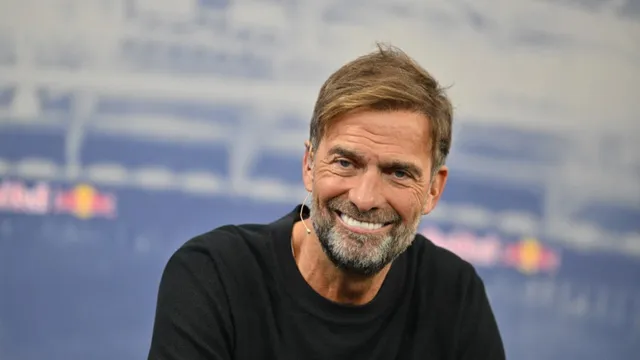
Jurgen Klopp embraces global soccer role at Red Bull
2025-01-15 03:05- Jurgen Klopp officially began his role at Red Bull on January 1, 2025, after leaving Liverpool.
- During his first press conference on January 14, 2025, he expressed excitement about supporting Red Bull's football philosophy.
- Klopp confirmed he will not serve as a coach for any Red Bull teams, focusing instead on broader strategic objectives.
Express your sentiment!
Insights
In Austria on January 14, 2025, Jurgen Klopp held his initial press conference as the head of global soccer at Red Bull. Klopp, having concluded a notable nine-year tenure at Liverpool, officially commenced his position on January 1, 2025. He articulated his enthusiasm for the role and emphasized his desire to contribute meaningfully to football's development through the Red Bull ethos, albeit indicating that he would remain detached from day-to-day club management and coaching responsibilities. Klopp stated that he had no intention of returning to coaching soon, although he noted a contractual clause that could allow him to consider the role of Germany manager in the future. Despite facing criticism for joining Red Bull due to their controversial standing within German football, Klopp insisted he ceased management at Liverpool consciously and expressed a growing appreciation for his new position away from the relentless demands of club management. He noted that he would prioritize supporting sports directors in enhancing the Red Bull philosophy without implementing drastic changes immediately. He also shared candid views about competitions like the Club World Cup, criticizing its structure and suggesting an overall reduction in match schedules for the betterment of the sport. Klopp's strategic role will not involve influencing club operations but aims to leverage Red Bull’s resources to elevate football's effectiveness. His presence will contribute to shaping the identity and operational philosophies for clubs within the Red Bull network, which includes RB Leipzig and Red Bull Salzburg, as well as the New York Red Bulls. This appointment marks a fascinating new chapter for Klopp as he explores new avenues in soccer management. The future interactions between Klopp and the various Red Bull clubs, especially how his philosophies will integrate with existing operations, remain to be seen. As Red Bull is a significant stakeholder in the football world, his role is pivotal in ensuring that the company navigates its controversial elements while upholding its footballing ideals. Klopp's remarks about the Club World Cup and necessary improvements signal potential shifts within the Red Bull approach and may resonate throughout the football community as they seek to refine their international footballing strategy.
Contexts
The Red Bull brand has carved a unique niche in the football world, forging a distinct football philosophy that emphasizes energy, dynamism, and an aggressive style of play. This philosophy is deeply rooted in the wider branding and marketing strategies employed by Red Bull, which seeks to promote a high-energy lifestyle. Red Bull's approach to football is characterized by a commitment to developing young talent, an intense pressing game, and a focus on teamwork, which together create a vibrant, attacking style that often translates into success on the field. The integration of these principles into the fabric of their clubs is not merely a tactical choice but a holistic philosophy that governs all operations, from player recruitment to coaching methods and game strategy. In pursuing this footballing model, Red Bull has established clubs in various leagues worldwide, most notably RB Leipzig in Germany and New York Red Bulls in the United States. Each of these clubs operates under the same guiding principles, tailoring the specifics to their local contexts and league requirements. The clubs foster environments that prioritize the development of young players, often blending them with experienced professionals to create balanced squads. The emphasis on youth development is further strengthened by the investment in state-of-the-art training facilities and a robust scouting network, ensuring that the pipeline for talent remains strong. At the core of Red Bull's football philosophy is the commitment to a high-pressing game that aims to regain possession quickly and create scoring opportunities through relentless offensive pressure. This style requires players to possess not only technical skills but also exceptional physical fitness and mental resilience. The teams are designed to function as cohesive units, with players understanding their roles within a fluid system that enhances their ability to connect and create plays. This tactical approach has garnered both domestic and international attention, often leading to impressive performances in various competitions, as evidenced by RB Leipzig's rise to prominence in the Bundesliga and their participation in European tournaments. Red Bull's impact on football extends beyond the pitch, as the brand also influences the larger culture surrounding the sport. The marketing strategies employed by its clubs integrate modern media outreach and fan engagement initiatives, thus promoting a brand that resonates with a younger audience. By blending sport with lifestyle branding, Red Bull has transformed the footballing experience into one that celebrates a comprehensive and exciting way of life. This combination of high-octane football, youth development, and savvy marketing positions Red Bull as a pioneering force in the contemporary football landscape, redefining expectations of what a football club can be.